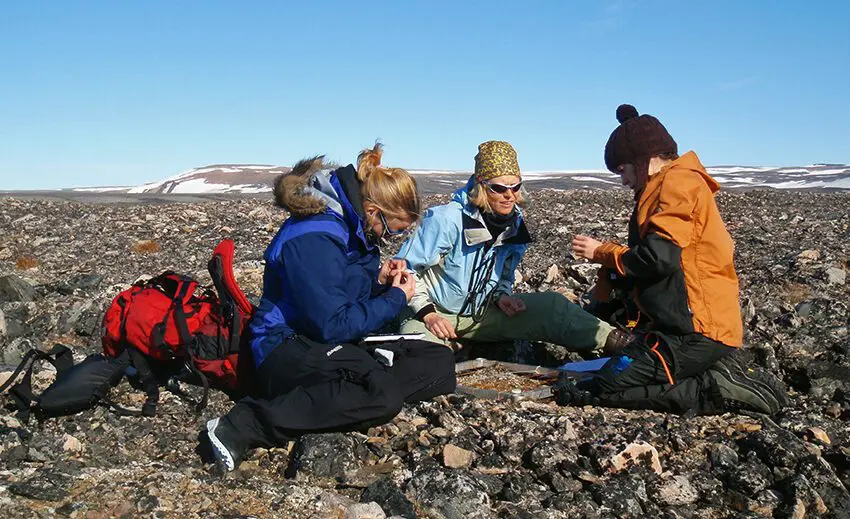BioCEED Centre of Excellence in Biology Education granted status of excellence for five new years

Pernille Bronken Eidesen with AB-201 biology students, August 2010. Photo: Steve Coulson/UNIS
Top image: Associate professor in terrestrial Arctic biology, Pernille Bronken Eidesen, supervising bachelor students in Svalbard.
Photo: Steve Coulson/UNIS
After a comprehensive mid-term evaluation, NOKUT (the Norwegian Agency for Quality Assurance in Education) has decided that CEMPE, bioCEED and MatRIC can continue as a Centres of Excellence in Education.
12 December 2017
First published on NOKUT.no
– This is a big day! I would like to extend my congratulations to all three centres and all their partners, says NOKUT director Terje Mørland after today’s board meeting. He is very pleased that the work the centres have laid down in education in biology, mathematics and music has given results and that they can now continue the outstanding work they have begun.
– The centres have gained much in a short period of time. All centres have developed a number of successful programmes, projects and actions. At the same time, they have demonstrated their contributions and improvements in teaching practices in a convincing way. During the mid-term evaluation, the centres have developed good strategies for further development of educational practices.
Unanimous committee
The centres have been evaluated by an international expert committee led by Professor Paul Ashwin from Lancaster University. The committee recommended unanimously and without reservation that NOKUT’s Board of Directors should grant bioCEED, CEMPE and MatRIC CEE status (Centre of Excellence in Education status) for a new five-year period. The expert committee was impressed by what the centres have achieved. All centres have made great progress since they received CEE status and achieved good results not only for their own institution, but also nationally and internationally.
Challenging evaluation
Mørland emphasizes that the centres have been through a demanding process:
– The centres had to document the results and what they had achieved in the first period. The committee has interviewed students, teachers, management, employees at the centres, employers, and other stakeholders. In addition, the centres have submitted self-evaluations and plans on several occasions following comments from the expert committee.
The latter is especially related to the fact that the mid-term evaluation also has further development as a goal. The committee will assist the centres in this during the next period, and all centres have provided an action plan based on strengths and weaknesses from the first period.
Brief facts about Centres of Excellence in Education and bioCEED
The prestige label ‘Centre of Excellence in Education’ entails funding for five years with the possibility of renewal for another five years. CEMPE, bioCEED and MatRIC gained centre status in 2014.
BioCEED is a consortium between the Department of Biology at the University of Bergen, the Department of Arctic Biology at UNIS, the Department of Education at the University of Bergen, and the Institute of Marine Research. Pernille Bronken Eidesen at UNIS, deputy leader in bioCEED, is very pleased with the committee’s conclusion:
– I am looking forward to continuing working on making teaching in biology even better. A lot of the bioCEED philosophy has been reflected in an ongoing strategy process at UNIS, where we aim to have research-based teaching, both in content and the way we teach. We have been working actively to create an educational culture that is more like a research culture – where we work on renewal, reading literature, collaborating, sharing and evaluating each other.
Read the evaluation report from NOKUT (PDF)